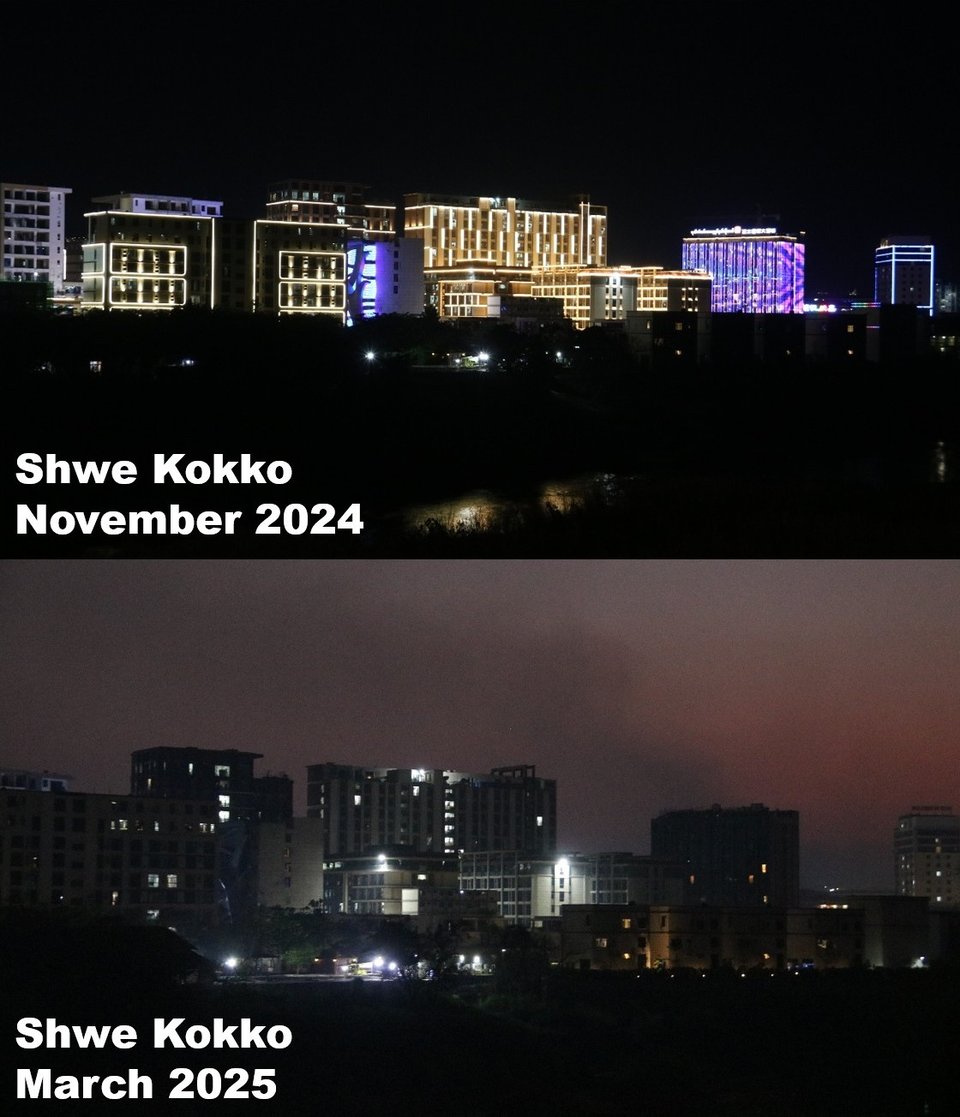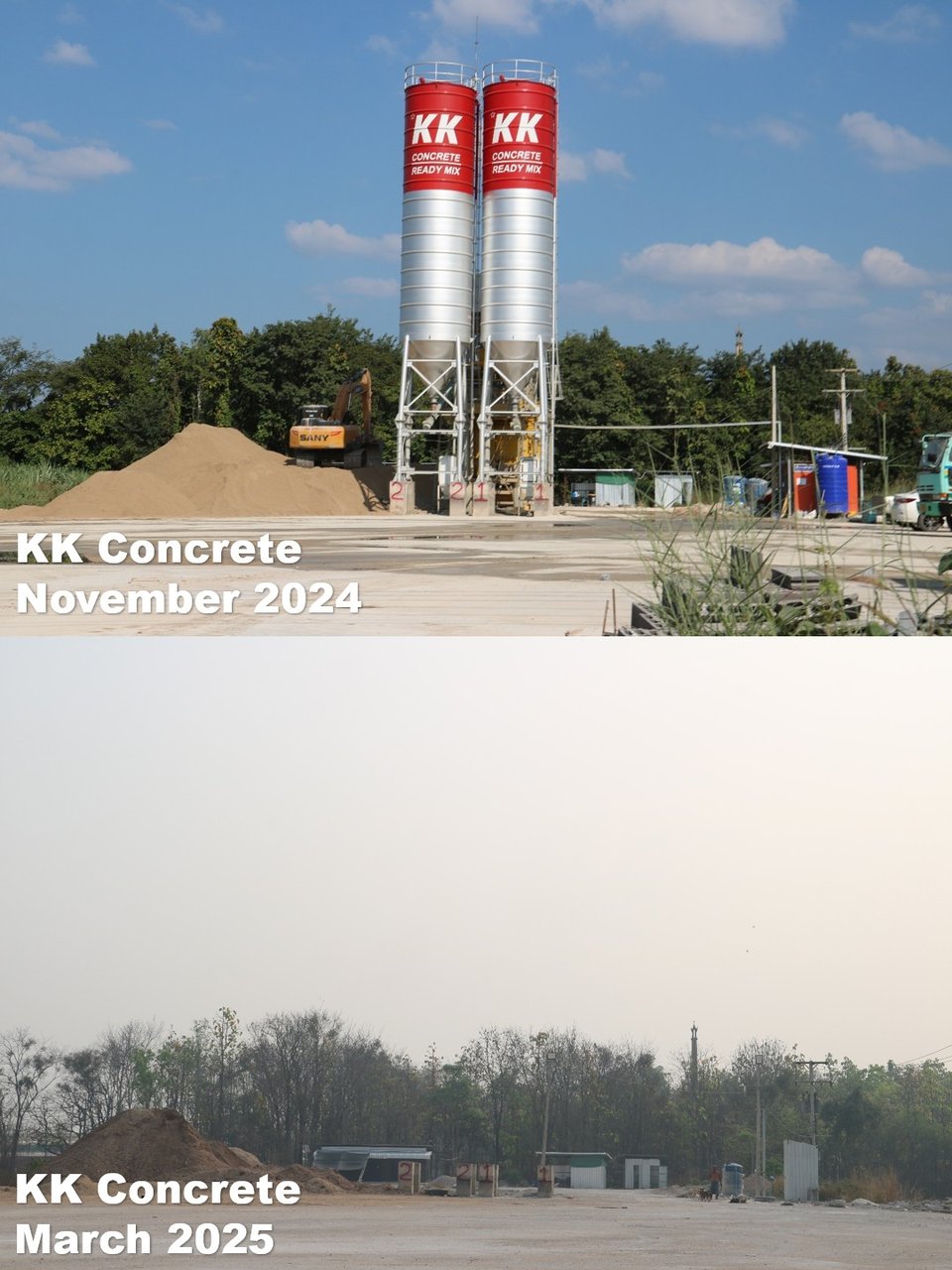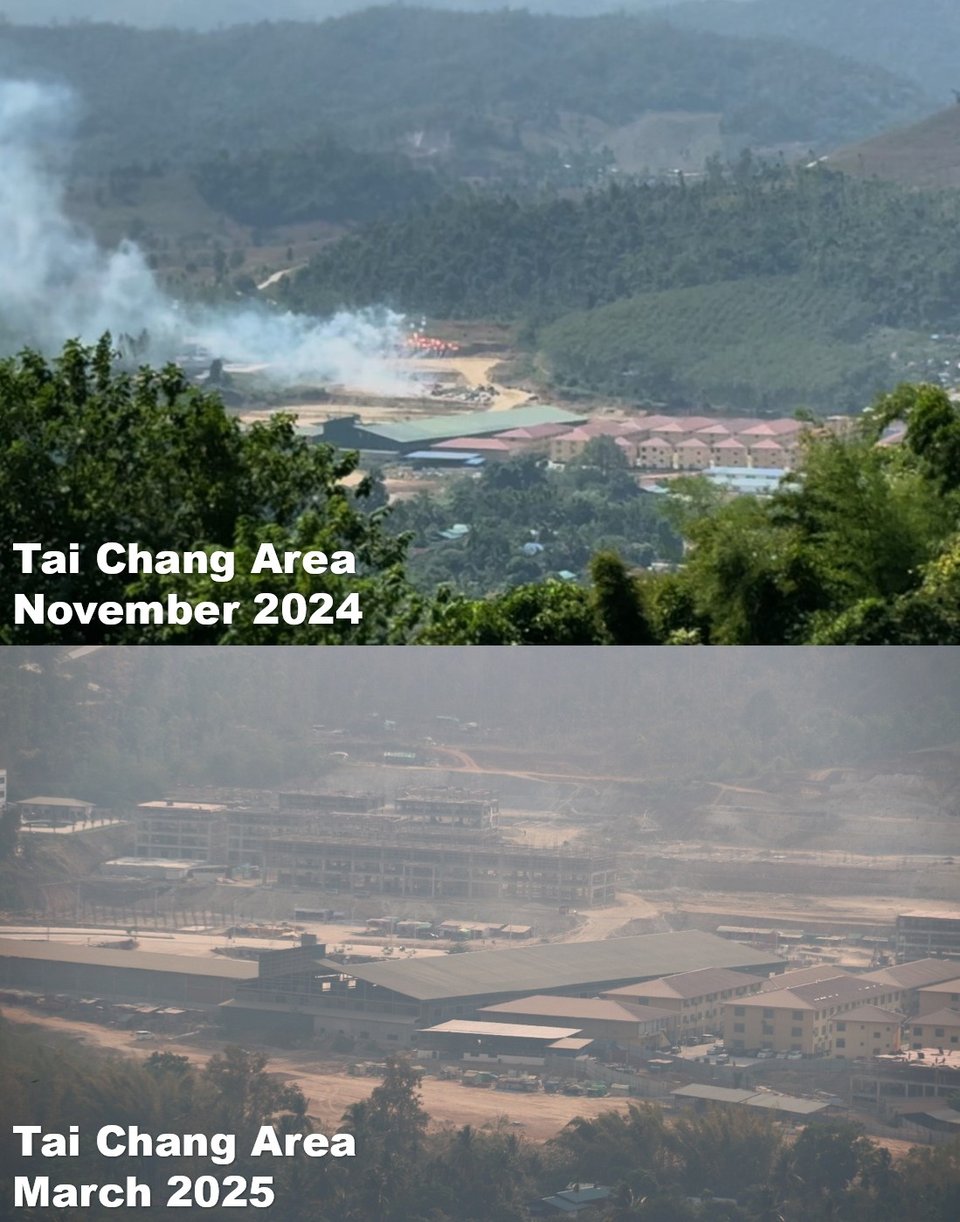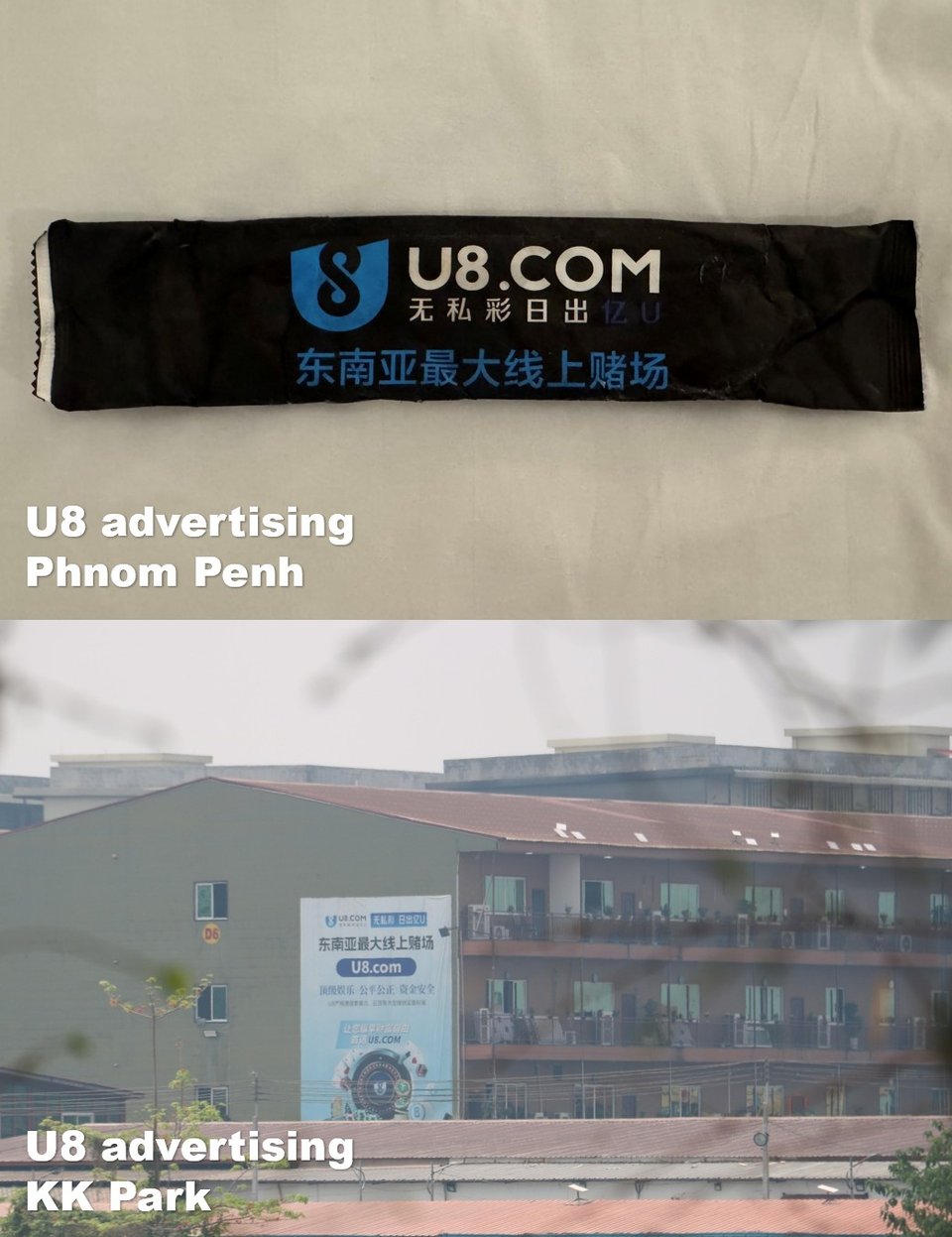Frontline Updates From the Thai-Myanmar Border
Heavy construction, military deployments, international airlifts and other take-aways from a recent visit to a global scamming hotspot.

The narrow, rural road leading to KK Park felt different last week than it did last time I visited four months ago. There were signs posted across the river from Southeast Asia’s most notorious scam compound warning people about being tricked into working as online fraudsters. Before you can reach the water’s edge, you’ll get also stopped at a Thai military checkpoint where officers will check and make sure you’re not being trafficked into scam labor. And yet, just a few meters beyond, you’ll see trucks going in and out of a ferry gate to deliver cement to KK Park, which is busy expanding even as it faces mounting pressure and scrutiny.
That is, in a nutshell, the paradox unfolding on the edges of the narrow Moei River separating Thailand’s western Tak Province from Myanmar’s Karen State. In recent years, the region has become a global hotspot for cybercrime as scam compounds like KK Park have proliferated along the Myanmar side of the river, using Thailand’s electricity, internet connectivity and roads to power their operations and supply everything from fuel to building materials to Starlink receivers, bundles of cash and thousands of workers who toil inside these grim criminal fortresses.
Not much was being done to prevent any of this from happening. But that changed after the January 3 kidnapping of Chinese actor Wang Xing to a Myanmar scam compound. The brazen kidnapping focused public attention on scam-linked human trafficking like no other news story that I’ve seen here in Asia. It was as if a fuse had been lit, at last, on the powder keg of public anger at authorities’ failure to confront the spread of cybercriminal gangs across the region. China dispatched officials to Thailand to coordinate a response and the topic of online scams reached the highest levels of government. In early February, Thailand cut electricity, internet service and fuel supply to Myanmar’s scam hubs, and deployed troops to patrol the border. Soon after, the Myanmar junta-aligned Karen Border Guard Force began making plans to deport foreigners from scam compounds in areas it controlled. By February 26, the BGF had prepared a list of 7,141 people from 28 nationalities for repatriation.
The headlines sounded encouraging, so I decided to visit the region again to learn more. I teamed up with Erin West, founder of the anti-scam coalition Operation Shamrock, who I also accompanied on my previous trip to the Thai-Myanmar border last November. Erin, a former prosecutor, has a sharp eye for detail, so it was great to retrace our steps and notice what has (and hasn’t) changed in and around the border town of Mae Sot since November. Below are a few highlights.
Repatriations are starting to happen
Arriving at the Mae Sot airport, you step off of the airplane right into a news story. Busloads of ex-scam industry workers unload nearby and board planes bound for their home countries. While I was in Mae Sot, China and India flew back 1,439 and 540 of their nationals, respectively. Other countries are also working to get their citizens home, and there are now operating procedures in place to help them do that. But not everyone can cross the border just yet and there are thousands still waiting in overcrowded and unhygienic conditions for their turn to go home.

Lights dimmed over Shwe Kokko
Shwe Kokko is one of the most stunning sights in the region. It’s a newly-built city on the Myanmar side of the Moei River that leaps out of nowhere as you drive past sugarcane fields on the Thai side. Many of the buildings inside house scamming operations, and at night they used to light up like misplaced Las Vegas. But after the recent power cut, the lights are noticeably dimmer.

Thai military checkpoints
Back in November, I didn’t pass any Thai military checkpoints or human trafficking warnings signs on the rural roads along the river. Now, there’s plenty of both, and the checkpoints aren’t just for show; they do stop cars and ask questions. I also witnessed a planning meeting of the Thai border guards on a hill overlooking KK Park. So border security has been stepped up a notch.


Shifting supply chains
Concrete mixers were a constant presence on the roads leading to the Moei River during our November trip. There were fewer of them this time around, perhaps because a large concrete mixing plant called “KK Concrete” was gone. It looked like it had moved to a new location across the river. Another supplier was instead shipping cement powder to KK Park via a dedicated ferry crossing on the Moei River, which continued to operate uninterrupted.

A giant construction zone
Building materials are still in huge demand because all along the Moei, scam compounds are still very much in expansion mode. There are construction sites visible from as far south as Chong Khaep (opposite of the infamous Tai Chang compound) and as far north as Shwe Kokko. Back in November, Erin and I spotted fireworks going off near a red stage at Tai Chang labeled, “groundbreaking ceremony.” Four months later, the dirt clearing on which the stage stood has been replaced with the concrete frame of a large new building and forests have been cleared for more construction nearby. The pace of expansion is stunning.

So despite the ongoing repatriations of ex-scam industry workers, compound owners are getting ready to staff up again. What does that mean for the moment we’re in? During our travels, Erin called it a “layoff” for Myanmar’s scam industry which, even after recent events, is estimated to have a workforce of up to 100,000. I think that’s an apt assessment given how entrepreneurial and deeply entrenched the region’s cybercriminal networks have become. The extent to which they’re finally going to be uprooted will depend a lot on the strength and durability of the international pressure and scrutiny that exploded in the wake of Wang Xing’s kidnapping. If there’s ever been a moment for fraud victims and human trafficking survivors and their families to speak out and make their voices heard, this seems to be it.
Open for business
While Myanmar’s scam industry is experiencing a layoff, Cambodia’s in the midst of a hiring spree. It is just as much a construction zone as Myanmar, and Telegram ads for the new real estate that’s being built in the country’s border towns aren’t encouraging. One recent ad for a newly-built office park was seeking money laundering businesses and scammers targeting foreigners. Erin went on a tour of some of Cambodia’s scamming hotspots, and I encourage you to check out her LinkedIn posts describing what she saw. It is hard to disagree with her conclusion: “Scamming has become the business of Cambodia.”
The mystery of U8
Speaking of Cambodia, how’s this for a strange dining experience? Before departing for Thailand, I went to grab take-out in Phnom Penh’s Chinese business district. My noodles came with a cutlery set wrapped in an advertisement for “U8” – an online gambling outfit that bills itself as “Southeast Asia’s largest online casino.” A few days later, as I peeked through the woods surrounding KK Park, I saw U8 advertisements plastered all over its walls. Video footage from The Reporters’ recent visit to KK Park featured even more U8 ads, which raises an obvious question: What exactly is U8 and why does it advertise so heavily inside KK Park? If you have any insights to share, please reach out.

Thank you for joining me on this journey as I piece together the story of Southeast Asia’s scamming industry for The Big Trace. If you’ve read this far and know of someone who’s interested in these pressing issues, please tell them to sign up for The Big Trace newsletter to get more updates from the field.